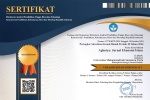Prinsip Redistribusi Kekayaan Dalam Surat At-Taubah: Solusi Islam Untuk Keadilan Ekonomi
Abstract
Full Text:
PDFReferences
Ahmad, U. S. (2022). Zakat, Infak, Sedekah, Wakaf dalam Filantropi Islam. Yasin, 2(5), 749–761. https://doi.org/10.58578/yasin.v2i5.1048
Al-Ghazali, A. H. M. bin M. (2011). Ihya Ulumuddin (Jilid 3). Beirut: Dar al-Ma‘rifah.
Al-Hamed, S. (2024). The Function of Zakat in Islamic Economics: An Analytical Study. International Uni-Scientific Research Journal of Humanities and Social Sciences, 5, 4–10. https://doi.org/10.59271/s45417.024.1558.2
Al-Qurthubi, I. A. ’Abdullah M. ibn A. (2014). Tafsir al-Jami’ li-Ahkam al-Qur’an (Jilid 5). Beirut: Dar al-Kutub al-Ilmiyyah.
Al-Roubaie, A. (2022). Islamic Social Finance and Global Inequalities: The Case of COVID-19. TAFHIM: IKIM Journal of Islam and the Contemporary World, 15(2), 1–26. https://doi.org/10.56389/tafhim.vol15no2.1
Al-Tabari. (2001). Tafsir al-Tabari (Jilid 6). Kairo: Dar al-Ma’arif.
Amirullah, M., & Rohman, P. S. (2024). Ontologi Ekonomi Islam Ibn Khaldun: Sebuah Pendekatan Holistik. Misykat Al-Anwar Jurnal Kajian Islam Dan Masyarakat, 7(2), 93. https://doi.org/10.24853/ma.7.2.93-104
Aqbar, K., Herman, S., & Asri. (2021). Pemaksaan Zakat oleh Pemerintah dalam Perspektif Hukum Islam dan Penerapannya di Indonesia. BUSTANUL FUQAHA: Jurnal Bidang Hukum Islam, 2(1), 78–97. https://doi.org/10.36701/bustanul.v2i1.325
Azlina, N., Maesarach, R. M., & Said, M. (2022). Islamic Economic Methodology Aproach to Achieve Economic Equity: Epistemological Study. BASKARA : Journal of Business and Entrepreneurship, 4(2), 28–39. https://doi.org/10.54268/baskara.4.2.28-39
Darajat, U. A., Suharto, S., & Bahrudin, M. (2021). Implementasi Operasional Zakat Infak Dan Sedekah Dalam Menwujudkan Kesejahteraan Perspektif Ekonomi Islam (Studi di Koperasi Simpan Pinjam Pembiayaan Syariah Baitul Maal Wat Tamwil Fajar Metro). Ijtimaiyya: Jurnal Pengembangan Masyarakat Islam, 14(1), 55–90. https://doi.org/10.24042/ijpmi.v14i1.6557
Emamzadeh, A., & Reza, M. (2020). Analysis of economic convergence of Islamic justice in selected Islamic countries. Journal of Economic Structures, 9(1), 24. https://doi.org/10.1186/s40008-020-00191-8
Fayokemi, A. W., & Olumilua, B. (2023). Zakat Management System: an Islamic Manifestation of Man’S Humanity To Man. Edumania-An International Multidisciplinary Journal, 01(03), 142–159. https://doi.org/10.59231/edumania/9003
Fitradinata, K., Fadhli, M., Nugraha, R. F., & Hasan, Z. (2024). Poverty Alleviation Strategy Through the Sharia Economic Model. Maklumat: Journal of Da’wah and Islamic Studies, 2(2), 50–63. https://doi.org/10.61166/maklumat.v2i2.20
Ganiyev, A., & Umaraliev, S. (2020). the Role of Zakat in the Early Stages of the Islamic Civilisation. EPRA International Journal of Multidisciplinary Research (IJMR), 441–444. https://doi.org/10.36713/epra2823
Hasan, M., & Abdullah, M. (2008). The Role of Zakat in Poverty Alleviation: A Comparative Study of Zakat Institutions in Muslim Countries. Jeddah: Islamic Research and Training Institute (IRTI).
Hasanah, U., Harisah, H., & Al Humaidy, M. A. (2024). Innovation in Distribution of Wealth Through Zakat: Building Shared Prosperity by Applying Tafsir Qs. At-Taubah Verse 60. Al-Hiwalah : Journal Syariah Economic Law, 3(1), 13–31.https://doi.org/10.47766/alhiwalah.v3i1.2568
Jedidia, B. K., & Guerbouj, K. (2021). Effects of zakat on the economic growth in selected Islamic countries: empirical evidence. International Journal of Development Issues, 20(1), 126–142. https://doi.org/10.1108/IJDI-05-2020-0100
Kahf, M. A. (1989). The Economics of Zakat: A Comparative Study (Jilid 1). Herndon: International Institute of Islamic Thought (IIIT).
Katsir, I. bin U. bin. (2000). Tafsir al-Qur’an al-Azim (Tafsir Ibn Kathir) (Jilid 4). Beirut: Dar al-Fikr.
Lubis, N., & Sunandar, H. (2023). Interpretation of Waqf Distribution Verse in Islamic Economic Perspective. Enrichment: Journal of Multidisciplinary Research and Development, 1(1), 31–38. https://doi.org/10.55324/enrichment.v1i1.5
Maududi, A. A. (2000). Towards Understanding Islam (Jilid 1). Lahore: Kazi Publications Inc.
Meirison, M., Unani, T., & Kasmidin, K. (2022). Social Justice and Poverty: Islamic Economic Perspective. Li Falah: Jurnal Studi Ekonomi Dan Bisnis Islam, 7(1), 50. https://doi.org/10.31332/lifalah.v7i1.2225
Mukhid, M. (2024). Islamic Social Finance: Exploring Zakat, Waqf, and Sadaqah in Economic Development. Economics Studies and Banking Journal (DEMAND), 1(2), 46–52. https://doi.org/10.62207/jk7p6661
Rezeki, S. G., Ferdiansyah, V., Adisa, Y., Ginting, D. C. A., & Amelia, R. (2023). Fair Wealth Distribution Through Instruments in Islamic Economics. Cashflow : Current Advanced Research on Sharia Finance and Economic Worldwide, 2(3), 439–445. https://doi.org/10.55047/cashflow.v2i3.657
Solihati, G. P., Suhardiyanto, H., Hakim, D. B., & Irawan, T. (2023). Integrating Good Corporate Governance, Islamic Corporate Social Responsibility, Zakat, Syariah Governance, and Syariah Compliance: Exploring their Interconnected Impact on the Financial Health of Islamic Commercial Banks. Journal of Contemporary Administration and Management (ADMAN), 1(3), 271–277. https://doi.org/10.61100/adman.v1i3.94
Sulistiyo, B., Rasyid, F. A., & Saleh, C. (2024). Relevansi Prinsip-prinsip Hukum Ekonomi Syariah dalam Membangun Keadilan Sosial melalui Distribusi Ekonomi yang Adil. Ahkam, 3(1), 38–48. https://doi.org/10.58578/ahkam.v3i1.2478
Suziraha Dzulkepli, & Mohd Nizam Barom. (2021). Financial inclusion and the goal of distributive justice in Islamic economics. The Journal of Muamalat and Islamic Finance Research, 66–77. https://doi.org/10.33102/jmifr.v18i1.330
Yasni, R., & Erlanda, A. R. R. (2020). Challenges of Zakat Integration as Source of State Revenue. International Journal of Islamic Economics and Finance (IJIEF), 3(3). https://doi.org/10.18196/ijief.3238
Zainuddin, U., Iffa, M., Fajria, N., & Maula Aulia, S. (2020). Peran Zakat Dan Wakaf Dalam Pembangunan Ekonomi Umat Perspektif Ekonomi Islam. FiTUA: Jurnal Studi Islam, 202–234. https://doi.org/10.47625/fitua.v1i2.270
Zauro, N. A., Saad, R. A. J., & Sawandi, N. (2020). Enhancing socio-economic justice and financial inclusion in Nigeria: The role of zakat, Sadaqah and Qardhul Hassan. Journal of Islamic Accounting and Business Research, 11(3), 555–572. https://doi.org/10.1108/JIABR-11-2016-0134
DOI: https://doi.org/10.30596/aghniya.v7i1.23117
Refbacks
- There are currently no refbacks.
Aghniya: Jurnal Ekonomi Islam is licensed under a Creative Commons Attribution-ShareAlike 4.0 International License.
Aghniya: Jurnal Ekonomi Islam
Faculty of Islamic Religion,Universitas Muhammadiyah Sumatera Utara. Address: Kampus Utama Jl. Kapten Muchtar Basri No.3, Glugur Darat II,Medan Sumatera Utara-20238.
E-mail: aghniya@umsu.ac.id





